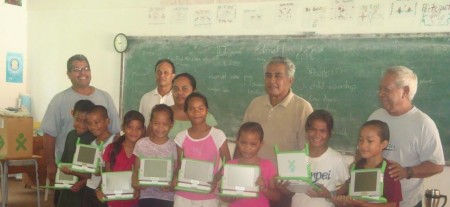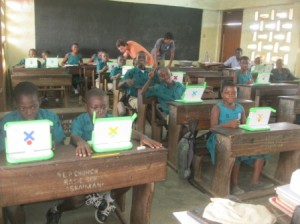This essay is reposted by Carlos Rabassa of Uruguay, from a lecture he gave in June.
Dr. Mitra gave an excellent lecture on June 2, 2011 at Universidad ORT in Montevideo, Uruguay on “The Future of Educationâ€.
His first major experiment was the hole in the wall computer, which was later replicated in many locations. They look like the ATM, Automatic Teller Machines, the banks use. They are computers connected to internet, located behind walls. The users have access, from the other side of the wall to the screen, a video camera and a touchpad.
These computers are accessible from streets in neighborhoods where kids had never used a computer. The children are not given any instructions. Researchers collect data for their studies on how the computers are being used.
Dr. Mitra started working in India his birthplace, then in England where he is now based, Newcastle University. He has been traveling and testing his findings all around the world. During the days preceding the lecture he had been working in Uruguayan schools.
He showed us studies made in India and in England. In India, they have problems getting teachers to work far away from the important population centers. In England teachers prefer not to work in areas where there is a large concentration of government subsidized housing.
In both places, it is hard to get teachers to work with the children they need them the most. That is the origin of his interest in researching how far can children go, by teaching themselves. The results of the computer in the hole in the wall, led Dr. Mitra to further his research in that direction.
In a question of hours, children with no knowledge of English and no computer experience surf internet. They ended up learning English at an amazing high level except for a horrible pronunciation. This was until they found out the dictionary offers sound recordings with the pronunciation for each word. And until they found dictation or voice recognition programs that work well only as long as the pronunciation is good.
Dr. Mitra stressed his background is not as an educator. His method in the many experiments he related to us, in different countries and languages, has always been the same:
– Let the children use computers connected to internet.
– Encourage them to work in groups of four.
– Let them talk among themselves.
– Let them move freely to another group if they feel more comfortable.
– Let them visit another group to pick up some ideas and then return to their own group.
– Challenge them with questions.
– Answer all requests for help from him by saying “I don´t know; I have to goâ€.
He found that when children are interested in learning, they learn.
They are not intimidated by difficult questions corresponding to age groups much older than their’s. They are not afraid of trying. They might fail in getting the final difficult answer requested but they keep trying and learning many other advanced subjects on the way.
In certain experiments, he found the students were able to make great progress towards these challenges usually given to much older children. After reaching a certain level, their learning would slow down. This was in England. He recruited volunteer grandmothers who would follow the work of the children and encourage them the way grandmothers do with their grandchildren, congratulating them at each step, and showing interest in their work. The result was another big progress in the level of achievement.
Grandmothers volunteer to talk over internet with far away children. There is no formal teaching, just reading fairy tales and talking in English. The result is improved English and specifically improved pronunciation.




